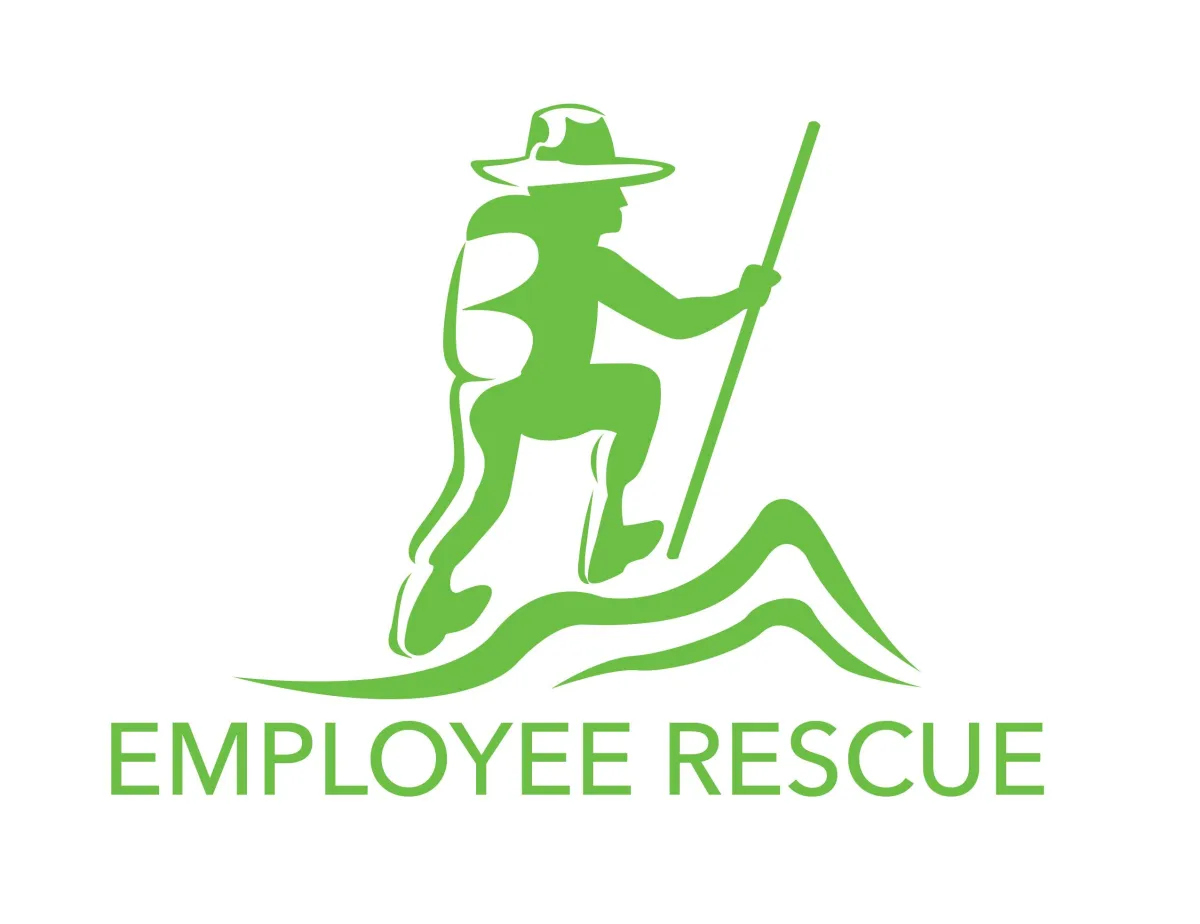
chris@employeerescue.org

chris@employeerescue.org
Could you rescue a key employee from the brink of quitting?
A ready strategy
Fast intervention
ROI in 7 steps

The Rescue Interview
“You can't go back and change the beginning, but you can start where you are and change the ending.” - C.S. Lewis
Introduction to an Emergency Employee Rescue Interview:
Dealing with an employee's resignation is tough, but it's also a chance to turn things around. An emergency employee rescue interview is your opportunity to connect with the departing employee, understand their reasons for leaving, and hopefully convince them to stay. In this guide, we'll walk through each step of the process in a professional but conversational way, focusing on empathy, communication, and finding solutions that work for everyone.
1. Begin With Authentic Kindness and Appreciation:
First things first, let's start by showing some genuine appreciation for your employee's hard work and dedication. Take a moment to acknowledge their contributions to the team and let them know that you value their honesty in letting you know about their decision to leave.
Remember, this isn't about reading from a perfect and magical script. Speak from the heart and make sure they feel genuinely appreciated. It's also not about holding hands and singing Kumbaya. It's about lowering the employee's resistance to having this conversation and making sure we truly uncover what's going on in their head and in their heart. You can't make a good decision until this is revealed with certainty and clarity.
2. Ask a Few Questions:
Now that we've reduced at least some of the resistance, it's time to ask a few questions. See if they're open to the idea of sitting down for a brief conversation. Use your own judgment if using the term "exit interview" would be helpful. Some may consider that too formal and raise their resistance back up. You really want to know if they're open to having an honest conversation.
Encourage them to share the good, the bad, and the ugly about their experiences and why they decided to seek employment elsewhere. Get their permission to take notes while assuring them everything will be kept confidential. You just want to be able to reflect back on the conversation and learn from it. Be humble. It's key.
3. Empathy and Understanding:
As the conversation progresses, it's essential to demonstrate empathy and understanding towards the departing employee's decision to resign. Acknowledge the significance of their decision and express empathy towards any challenges or concerns they may have faced leading up to it. Encourage them to share the factors or reasons that influenced their decision, emphasizing the importance of their feelings and experiences.
Again, you want them to share what's really going on inside them. It may take them a little while to feel comfortable. Some may be ready to unload both barrels. Whatever the case, you want their honest response.
4. Reflect on Contributions:
In the midst of discussing their resignation, take the opportunity to reflect on the departing employee's contributions to the team and the organization. Highlight their achievements, positive impact, and valuable contributions, reinforcing their value and importance within the company. By reminding them of their accomplishments and the difference they've made, you validate their efforts and reaffirm their significance to the team's success. This reflection serves to bolster their confidence and self-worth, potentially influencing their decision to reconsider their resignation.
Make sure you've done some research and know how they've legitimately contributed to your business success. People will sniff out insincerity and manipulation. Be prepared.
5. Open Communication:
Throughout the interview, prioritize open communication and active listening. Encourage the departing employee to express their thoughts, feelings, and concerns freely, without fear of judgment or reprisal. Avoid the temptation to deny, deflect, and defend against their feedback. This is the strategy of politicians and criminals. Instead, practice active listening techniques such as mirroring, paraphrasing, and summarizing to demonstrate you understand how they experienced you and your business.
You don't have to agree. You may not agree. It doesn't matter. You want their unfiltered thoughts and feelings, so you can make a good decision when this conversation is over.
6. Address Concerns:
If the departing employee raises specific concerns or issues during the interview, listen attentively and validate their feedback. Assure them that their input is valuable and that you take their concerns seriously. Avoid becoming defensive or dismissive; instead, acknowledge their perspective and express a genuine willingness to address their concerns and find a mutually beneficial solution.
A response like, "I appreciate you sharing your concerns with me. Let's discuss how we can address these issues and work together to find a resolution. Are you open to that?" This kind of question opens a door to the future. You want the employee to see himself with you in the future... for now. You can still make your best decision when the conversation is over and all the data is gathered.
7. Future Outlook:
As the conversation progresses, shift the focus towards the future outlook for the team and the organization. Share your vision for the company's growth, success, and the role that the departing employee could play in achieving these objectives. Emphasize the value of their skills, expertise, and experience, highlighting their potential contributions to the team's future endeavors.
Ask the employee about his hopes and dreams for the future. Help him connect the work he does and can do in the future to his future self and the dreams he wants to accomplish. Don't make promises you can't keep here. Make certain you've thought this through completely first. Remember, any insincerity will be sniffed out as a manipulation.
8. Potential Solutions:
In exploring potential solutions to address the departing employee's concerns, adopt a collaborative and problem-solving approach. Brainstorm ideas, suggestions, and compromises that could mitigate their concerns and improve their experience within the organization. Propose actionable steps, initiatives, or changes that demonstrate a genuine commitment to addressing their needs and fostering a positive work environment. By involving them in the solution-seeking process, you empower them to take ownership of their experience and contribute to positive change within the organization.
You're listening for words that indicate they are connecting their future to remaining with your business.
9. Express Commitment:
Throughout the interview, reiterate the company's commitment to the departing employee's growth, well-being, and job satisfaction. Apologize for any shortcomings or challenges they may have faced during their tenure and express a sincere commitment to improvement. Emphasize your desire to support their professional development, address their concerns, and create a work environment where they feel valued, respected, and fulfilled.
It may sound something like this from you, "We're committed to making this a great place to work for you. We’re about to embark on a change management effort to become the most sought-after employer of choice in our community. Are there specific changes or adjustments that would make you reconsider your decision and help us create a work culture you would love to stay and grow in?"
10. Closing:
As the interview draws to a close, invite the departing employee to take some time to reflect on the conversation and their decision to resign. Express gratitude for their openness, honesty, and willingness to engage in dialogue.
You're going to have to be a little vulnerable here. Consider closing with this idea, "I’m sorry if we’ve not been as good as you have needed us to be to this point. We want to commit to a new way of walking alongside you, helping you discover your individual mission and purpose and then connect that to the work you’re doing here. Is that something worth staying for? I want you to be confident we are committed to supporting your professional growth and ensuring that your experience here aligns with your career goals”
Now, give them time to respond and ask more questions if they have them. At this point, only listen and answer specific questions. End the conversation by thanking them and asking if you can follow up with them tomorrow or another time of their choosing.
Conclusion:
Conducting an emergency employee rescue interview is all about empathy, communication, and finding solutions that work for everyone. By following these steps and keeping the conversation friendly and open, you can increase the chances of convincing your employee to stay and contribute to a positive and thriving workplace culture. There's a real financial impact to reversing a resignation too. We'll talk about that in a future blog post.
Does this sound like you?
Problem #1
I have a key employee that just gave me a 2-week notice. Their contribution to our company is crucial to our success right now. If they leave, production decreases and it's possible I could lose both customers and other employees.
Problem #2
I have a very talented employee but he isn't performing to his potential and I don't know exactly why. How can I tell if this is a personnel problem, a motivation problem or a process problem?
Problem #3
We're growing like crazy but I can't find enough good people to deliver products and services at a level we can scale profitably. How do I get more and better candidates seeking me and my company rather than chasing what's left over?
It's possible to rescue at-risk employees...

"I had the pleasure of working with Chris. He had a particular gift of relating to everyone and bringing teams together. He raised up people and credited them with achievements, making them trust and respect him. He also brought laughter and humanity to the workplace."
• Denise G. | Dayton
About Chris
I've spent over 30 years as a clinician, business owner and director of operations in community health care. Having served in church leadership for many years as well, I've developed a unique perspective about how to engage employees and align their mission and purpose with you and your company.
My degrees are in Sports Medicine and Physical Therapy, so it's always been about people first.
Seeing people for who God created them to be, with infinite value and potential, is critical to solve your turnover and retention problems. You can proclaim "no one wants to work" and watch your self-fulfilling prophecy happen all around you... or, we can work together to your competitive advantage so you are the most sought-after employer of choice in your community.
It's your call.

To Take The Next ACTION Step...

chris@employeerescue.org

